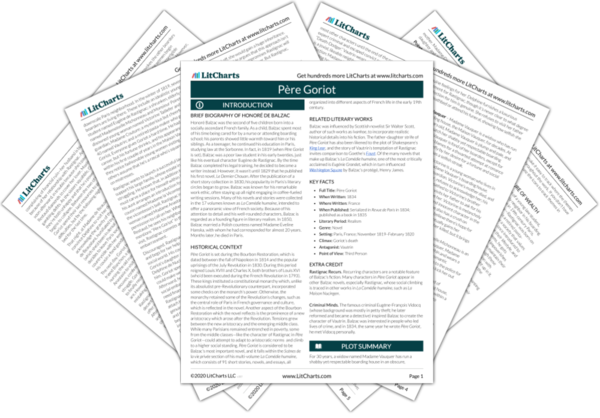Vautrin Quotes in Père Goriot
‘You stand at the crossroads of your life, young man, you must choose. You have already made one choice; you went to see your Beauséant cousin and had a taste of luxury. You went to visit Madame de Restaud, Père Goriot's daughter, and had a taste of how Parisian women live. That day you came back with a word marked on your forehead, and one I could read easily enough: Succeed! succeed at any price. Bravo! I said, there's a lad after my own heart.’
‘If I have one more piece of advice for you, my pet, it is not to stick to your opinions any more firmly than to your words. When you are asked for them, sell them. A man who boasts that he never changes his opinions is a man committed always to follow a straight line, an idiot who believes in infallibility. There are no such things as principles, only events; no laws, only circumstances. Your exceptional man adjusts to events and circumstances in order to control them. If there really were fixed principles and fixed laws, nations would not keep changing them as we change our shirts.’
What moralists call the depths of the human heart are merely the disappointments, the involuntary reactions of self-interest. These ups and downs so often bemoaned, these sudden reversals, are quite calculated for the enhancement of our pleasures. Seeing himself well dressed, with smart gloves, smart boots, Rastignac forgot his virtuous resolution. Young people do not dare look into the mirror of their consciences when they are being tempted to do wrong, while those of riper years have already seen themselves reflected there; therein lies the difference between these two periods of human life.
In the course of the next few days Rastignac led an extremely dissipated life. He dined almost every day with Madame de Nucingen, and went everywhere as her escort. He would come home at three or four in the morning, rise at midday to get ready to go out, and then go for a turn in the Bois when it was fine. He wasted time like this, heedless of the cost, and absorbed all the lessons and allurements of luxury […] He played for high stakes, losing or winning a lot of money, and finally grew used to the extravagant life of the young man in Paris.
Rastignac was indeed in a state of perplexity which must be familiar to many young men. Whether she really loved him or was just leading him on, Madame de Nucingen had inflicted on Rastignac all the pains of a genuine passion […] For the past few months she had so inflamed Eugène's senses that she finally affected his inward heart. If in the initial stages of his liaison the student had believed himself to be the master, Madame de Nucingen had now gained the upper hand[.]
Everyone now fully understood Vautrin, his past, present and future, his ruthless doctrines, his religion of indulging his own good pleasure, his regal authority, deriving from the cynicism of his thoughts and deeds and a power of organization applied to everything. The blood rushed to his face, his eyes glittered like those of a wildcat. He bounded up and down with such ferocious energy, he roared so fiercely, that he wrung cries of terror from all the boarders.
‘Try and be philosophical, Ma,’ Collin went on. ‘Did it do you any harm being in my box at the Gaîté last night?' he exclaimed. ‘Are you any better than us? The brand we bear on our shoulders is not as shameful as what you have in your hearts, flabby members of a putrid society. The best among you could not stand up to me!’
It was midnight. […] Père Goriot and the student returned to the Maison Vauquer talking about Delphine with increasing fervour, each trying to outdo the other, expressing the strength of his passion in curious contention. Eugène could not deny that the father's love, unblemished by any selfish interest, left his own far behind in scope and persistence. For the father, his idol was always pure and beautiful, and his worship was intensified by all that lay in the past as well as in the future.
He saw society as an ocean of mire into which one had only to dip a toe to be buried in it up to the neck. 'The only crimes committed there are petty ones!' he said to himself. 'Vautrin was a bigger man than that.' […] In his thoughts he returned to the bosom of his family. He remembered the pure emotions of that tranquil life, he recalled days spent among those who held him dear. By following the natural laws of hearth and home, those dear creatures found complete, unbroken, untroubled happiness. Despite such worthy thoughts, he did not feel bold enough to go to Delphine and confess the faith of pure souls by bidding her follow Virtue in the name of Love.












